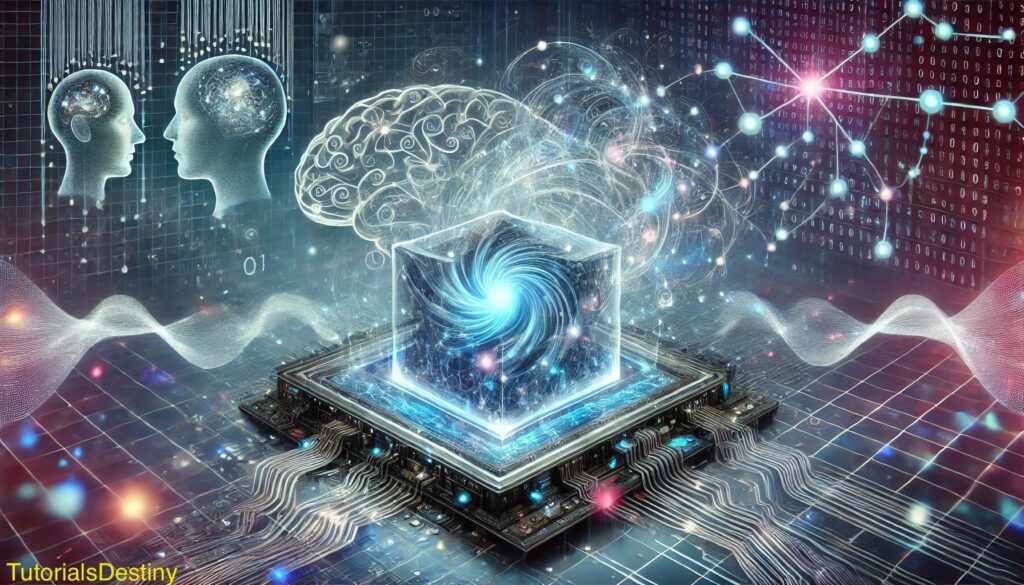The convergence of Quantum Computing (QC) and Artificial Intelligence (AI) is ushering in a new era of technological breakthroughs. By combining the unparalleled processing power of quantum computers with AI’s ability to learn and adapt, researchers are addressing some of the most complex challenges in science, technology, and society. This article explores the basics of quantum computing, its role in enhancing AI, applications across industries, challenges, and the ethical dimensions of this transformative synergy.

What is Quantum Computing?
Quantum computing is a revolutionary technology that uses the principles of quantum mechanics to perform calculations far beyond the capabilities of classical computers. Key concepts include:
- Qubits: The basic units of quantum information, which, unlike classical bits (0 or 1), can exist in a state of superposition (both 0 and 1 simultaneously).
- Entanglement: A phenomenon where qubits become interconnected, so the state of one directly influences the state of another, regardless of distance.
- Quantum Speedup: Quantum algorithms can solve certain problems exponentially faster than classical methods.
For tasks like optimisation, large-scale simulations, and pattern recognition, this computational power is game-changing.
How AI and Quantum Computing Complement Each Other?
AI is driven by the ability to process vast amounts of data and find patterns. Traditional computing often struggles with these tasks due to their sheer complexity. Quantum computing enhances AI in key ways:
- Faster Model Training: Machine learning models, particularly in deep learning, require immense computational resources to train. Quantum computers can reduce this time significantly.
- Better Optimisation: Many AI problems involve optimisation, such as finding the best route for logistics or minimising error in predictions. Quantum optimisation algorithms (e.g., QAOA) provide faster and more accurate solutions.
- Efficient Data Processing: Quantum computers can handle high-dimensional data and complex computations simultaneously, improving AI’s ability to process and interpret data.
- Enhanced Creativity: Quantum systems generate unique data patterns that can feed into generative AI models, improving applications like art creation and drug discovery.
Key Areas of Quantum-AI Integration
Quantum Machine Learning (QML)
Quantum Machine Learning combines quantum computing with traditional machine learning to solve complex problems faster and more effectively. Examples include:
- Quantum Neural Networks (QNNs): Use quantum operations to build neural networks that simulate complex data patterns.
- Quantum Support Vector Machines (QSVMs): Speed up tasks like classification and clustering in large datasets.
- Quantum PCA (Principal Component Analysis): Enables faster dimensionality reduction for datasets with millions of variables.
Natural Language Processing (NLP)
NLP tasks like sentiment analysis, translation, and chatbots often require massive computations. Quantum NLP speeds up matrix operations, enabling real-time language modeling with larger datasets.
Reinforcement Learning
Reinforcement learning is crucial in areas like robotics, self-driving cars, and game development. Quantum reinforcement learning can evaluate multiple actions simultaneously, accelerating decision-making processes.
Quantum-Assisted Computer Vision
Quantum computing enhances AI’s ability to process visual data, improving applications like medical imaging, object detection, and facial recognition.
Real-World Applications
The combination of quantum computing and AI is already showing promise in various fields:
- Healthcare:
- Quantum-enhanced AI speeds up drug discovery by analyzing complex molecular interactions.
- Helps optimise treatment plans tailored to individual patients through predictive modeling.
- Finance:
- Detects fraud more accurately by analysing large transaction datasets in real-time.
- Optimises investment portfolios by evaluating multiple market scenarios simultaneously.
- Energy:
- Improves power grid management and identifies new materials for sustainable energy solutions.
- Enhances weather prediction models to mitigate climate risks.
- Autonomous Vehicles:
- Processes real-time sensor data more efficiently for navigation and obstacle detection.
- Optimises routes dynamically to save time and energy.
Challenges in Combining Quantum Computing and AI
Despite the potential, there are significant challenges to integrating quantum computing with AI:
- Hardware Limitations: Quantum computers are still in their infancy. Issues like qubit stability and error correction (decoherence) limit their practical usability.
- Algorithm Development: While promising, quantum algorithms for AI are still in the experimental phase. Many require further refinement to become efficient and scalable.
- Cost Barriers: Building and maintaining quantum systems is expensive, making access limited to a few organisations.
- Talent Shortage: There’s a lack of professionals with expertise in both quantum computing and AI, slowing progress in this interdisciplinary field.
Ethical Considerations
The integration of quantum computing and AI raises profound ethical questions:
- Data Security: Quantum computers could potentially break existing encryption methods, putting sensitive data at risk.
- Bias and Fairness: AI models powered by quantum computing could still carry biases from their training data, amplifying societal inequalities.
- Regulatory Frameworks: Governments and organisations must establish guidelines to ensure these technologies are used responsibly and ethically.
Future Trends in Quantum-AI
Looking ahead, several exciting developments are on the horizon:
- Cloud-Based Quantum Services: Companies like IBM, Google, and Amazon are democratising access to quantum computing through cloud platforms. This will accelerate research in quantum-AI.
- Cross-Disciplinary Innovation: Increased collaboration between quantum physicists, AI researchers, and data scientists will drive breakthroughs.
- Quantum-AI Edge Computing: Combining quantum computing with Internet of Things (IoT) devices could enable real-time applications in fields like healthcare monitoring and smart cities.
Conclusion
The convergence of quantum computing and AI is not just a technological evolution—it’s a revolution. By unlocking new levels of computational power and intelligence, these technologies have the potential to redefine industries, solve global challenges, and improve lives. However, careful attention to ethical implications and sustained research investment will be crucial to harness their full potential.
Are you excited about the future of quantum computing and AI? Share your thoughts and insights on how this powerful combination can shape our world!
Leave a Reply